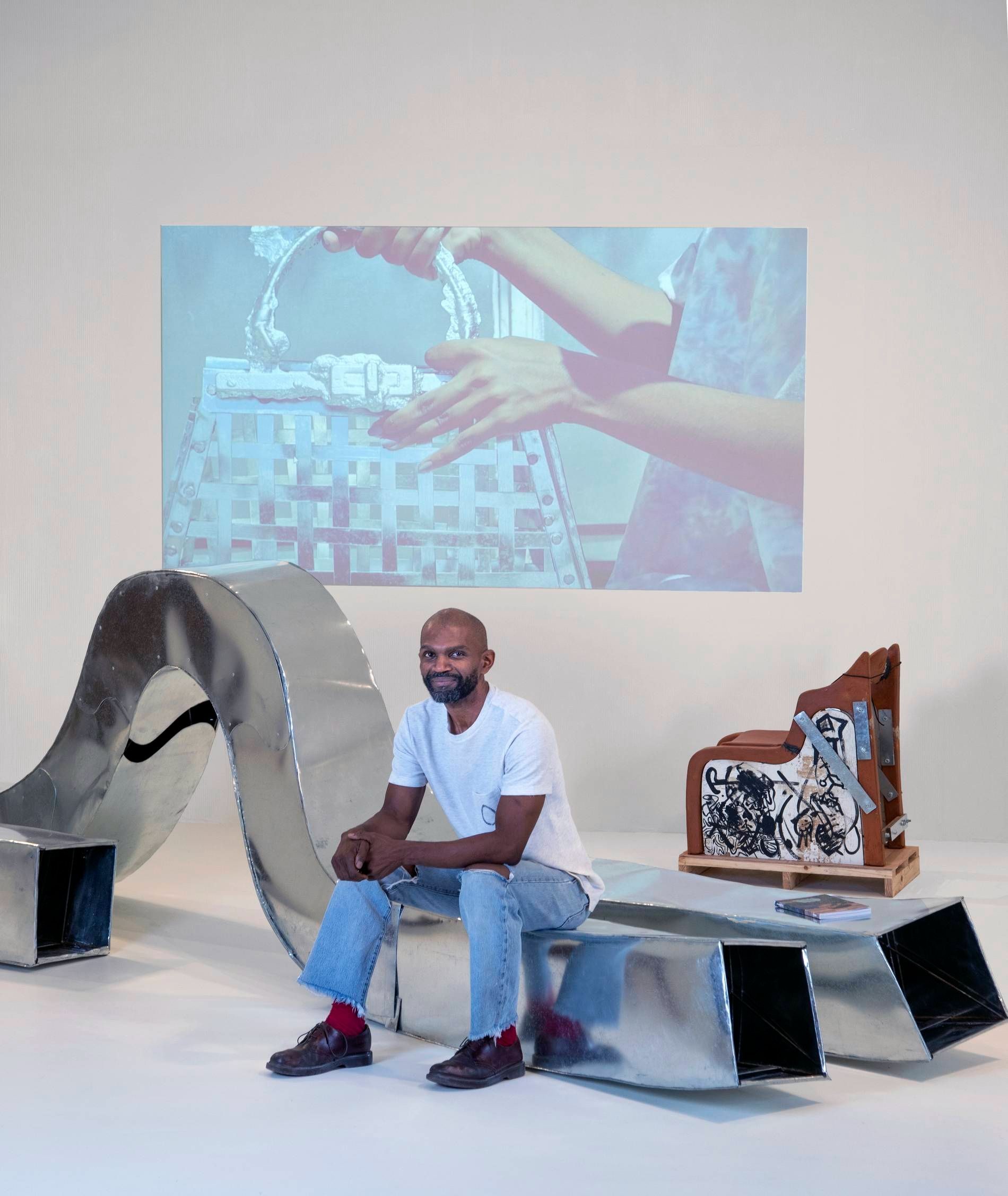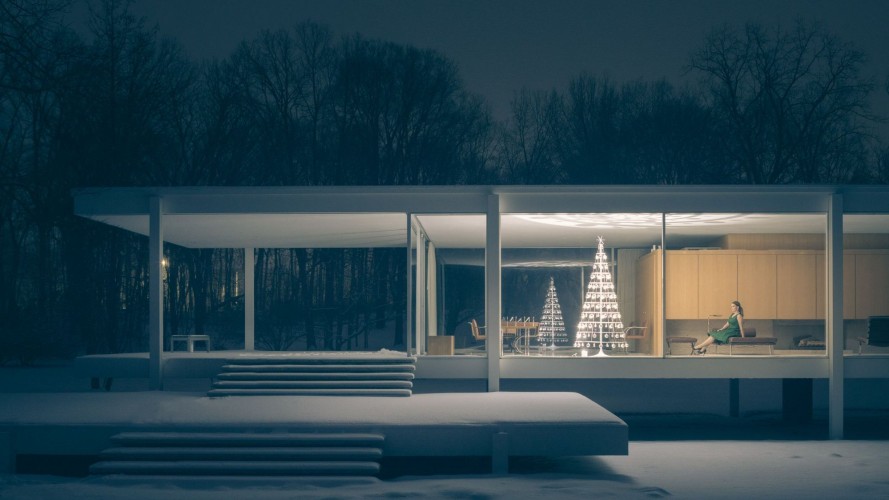MABEO x FENDI: Η παρουσίαση της Kompa Collection
DS.WRITER:
Σοφία Θρουβάλα
To Brand Mabeο ιδρύθηκε και πήρε το όνομά του από τον σχεδιαστή Peter Mabeο το 2006, στην Μποτσουάνα της Νότιας Αφρικής. Ο γνωστός πια designer με την ομάδα του δημιούργησαν ένα ισχυρό δίκτυο επικοινωνίας με τον χώρο της διαφήμισης και του design, δουλεύοντας πάνω σε σημαντικά projects σε Αφρική, Ευρώπη και Αμερική. Βασικός στόχος του Mabeο είναι να σχεδιάζει και να κατασκευάζει αντικείμενα που ενέχουν μια παραδοσιακή, θα λέγαμε, αισθητική, εντάσσοντας λαογραφικά στοιχεία της Αφρικανικής ηπείρου και κυρίως της Μποτσουάνα, προωθώντας έτσι την ταυτότητα του τόπου και αναδεικνύοντας την πολιτιστική κληρονομιά του.
Η κεντρική ιδέα είναι εκείνη της διατήρησης των αγνών πρώτων υλών, της ποιότητας κατασκευής και των τεχνικών διαχείρισης των φυσικών υλικών με έναν σύγχρονο τρόπο. Βασικό χαρακτηριστικό της παραγωγής τού Mabeο είναι η ειλικρινής απόδοση της παράδοσης, μέσω μιας μινιμαλιστικής, σύγχρονης και οικολογικής σχεδιαστικής προσέγγισης. Μάλιστα, όλα τα μέλη της οικογένειας Mabeο δουλεύουν με τρόπο παραδοσιακό, ως κατασκευαστές μιας μικρής κοινότητας με έντονο το αυθεντικό λαϊκό ιδίωμα, η οποία προσπαθεί να προωθήσει το local στοιχείο και να το επικοινωνήσει δημιουργικά μέσα από συνεργασίες, τόσο τοπικές όσο και παγκόσμιες, αφήνοντας όσο το δυνατόν μικρότερο οικολογικό αποτύπωμα, ενώ παράλληλα εισάγει τον ενδιαφερόμενο για το design σε μια πολιτισμική συνθήκη στην οποία δεν έχει εύκολα πρόσβαση ή τουλάχιστον δεν είναι το ίδιο προβεβλημένη και οικεία. Ιδιαίτερης σημασίας είναι το γεγονός πως, στην περίπτωση αυτή, η λαϊκή παράδοση δεν οικειοποιείται ούτε “διδάσκεται” διαμεσολαβημένα, αλλά αντιθέτως προάγεται από τους τοπικούς τεχνίτες μέσω του εφαρμοσμένου σχεδιασμού.
Πρόσφατα, η ομάδα του Mabeο σχεδίασε μια συλλογή με 10 κομμάτια υπό τον τίτλο Kompa, σε συνεργασία με το ρωμαϊκό luxury brand Fendi. Η Fendi (οι Kim Jones, Silvia Venturini Fendi & Delfina Delettrez Fendi) ζήτησε από τον Peter Mabeo και την ομάδα του να σχεδιάσουν από κοινού έπιπλα, δίνοντας έμφαση στην κατασκευαστική παράδοση της Μποτσουάνα και στις μινιμαλιστικές φόρμες που είναι πια αναγνωριστικές του brand. Η συλλογή με τίτλο Kompa παρουσιάστηκε τον περασμένο Νοέμβρη στο Design Miami 21.
Ο τίτλος της συλλογής Kompa σημαίνει ολοκληρωμένο, συμπαγές, κάτι το οποίο αποτελεί διακριτό χαρακτηριστικό όλων των αντικειμένων που την απαρτίζουν. Δεν είναι όμως ένας τίτλος που εκπροσωπεί τις ποιότητες των επιλεγμένων υλικών, ή τουλάχιστον δεν είναι μόνο αυτό, αφού φανερώνει και την ολιστική μέθοδο με την οποία το studio του Mabeο αποφάσισε να προσεγγίσει τη συνεργασία. Το “συμπαγές” αναφέρεται δηλαδή και στον τρόπο με τον οποίο η ομάδα δουλεύει, προκειμένου να δημιουργήσει την παρούσα συλλογή. Η διαφορετικότητα μεταξύ των αντικειμένων αλλά και ο συντονισμός τους σε ένα εμφανές σύνολο ομοιοτήτων, έχει να κάνει με τη σχέση των σχεδιαστών craftsperson μεταξύ τους, με τον τρόπο που η δημιουργία διασπάται σε πολλαπλά tasks, ώστε μέσα από συμφωνίες και διαφωνίες να υπάρξει ένα σύστημα συμβατών μεταξύ τους αντικειμένων. Το σχήμα που τελικά δίνεται στα αντικείμενα είναι προσφιλές, και μοιάζει το ένα κομμάτι να αποτελεί συνέχεια του επόμενου.
Αν και ολόκληρη η σειρά εμπνέεται από τη Fendi, δύο από τα έπιπλα της συλλογής αποτελούν άμεση αναφορά στον οίκο, φόρο τιμής στη συνεργασία. Το πρώτο, το σκαμπό efo, χρησιμοποιεί το διπλό εμβληματικό F του οίκου σαν μοτίβο, σαν φόρμα για το έπιπλο, συνδυάζοντας δύο διαφορετικές ποιότητες, δυο διαφορετικά υλικά: τον πηλό και το παραδοσιακό ξύλο panga panga, δημιουργώντας μια ισορροπία μεταξύ υλικού, τεχνικής διαδικασίας και εργόχειρου, δηλαδή μεταξύ παραδοσιακού και luxury. Ωστόσο, τα γλυπτικά αποδοσμένα σκαμπό, αν και αλληλοσυμπληρούμενα, διατηρούν μια εγγενή ανεξαρτησία και αυτονομία, όπως και τα δυο brands.
Το δεύτερο έπιπλο-αναφορά στη Fendi είναι η καρέκλα maduo. Συγκεκριμένα, η καρέκλα αποδίδει πιστά ένα υπάρχον o’lock κόσμημα, σχεδιασμένο από την Delfina Deletrrez Fendi για τον ρωμαϊκό οίκο. Η επεξεργασία της φόρμας γίνεται με έμφαση στα υλικά του brand Mabeο, και στη διατήρηση από τη μία της πολυτελούς λεπτότητας που παραπέμπει σε ένα κόσμημα, και από την άλλη της στιβαρότητας της κατασκευής που ανταποκρίνεται σε ένα καλό και πρακτικό έπιπλο.
Ολόκληρη η συνεργασία επιβεβαιώνει τον τίτλο της, με αντικείμενα που αποτελούν μια ενότητα φτιαγμένη από ατομικότητες. Το καθιστικό Loma δίνει την αίσθηση του ημιτελούς, που όμως μοιάζει να μπορεί να συμπληρωθεί νοητικά από τον θεατή/χρήστη, ακολουθώντας τήν ήδη πολύ συγκεκριμένη μορφή του και την υποψία συνέχειάς της. Στην ίδια λογική, το σύνθετο Chichira παίζει με τη διαμόρφωση των όγκων, διατηρώντας το ίδιο μοτίβο σε όλες τις εκφάνσεις του επίπλου, το οποίο αποδίδεται μάλιστα με ιδιαίτερη έμφαση στην παράδοση και το χειροποίητο.
Και τα δέκα κομμάτια εμπνέονται και αναφέρονται ανοιχτά στην iconic τσάντα χειρός της Fendi “Peekaboo”, ενώ μάλιστα, στην επίσημη παρουσίαση της Collection στο Miami, μαζί με τα έπιπλα προβαλλόταν και ένα βίντεο με τις Peekaboo, με αποτέλεσμα μια συσχετιστική (interrelating) συνεργασία σε προώθηση τόσο της πολυτελούς αισθητικής της Fendi όσο και της οικολογικής οπτικής των Mabeο, μέσω ενός “λαογραφικού”, θα λέγαμε, μινιμαλισμού.
Τέλος, το πιο ενδιαφέρον είναι το πώς μπορούν να συγκεραστούν επιτυχώς τα δυο αυτά στοιχεία, χωρίς το αποτέλεσμα να γύρει περισσότερο από τη μια ή την άλλη κατεύθυνση. Αυτό αποτελεί και τη μεγαλύτερη επιτυχία του Peter Mabeo, ο οποίος καταπιάστηκε και επεξεργάστηκε δημιουργικά κάτι ξένο από αυτά που μέχρι στιγμής αποτελούσαν τη σημαντικότερη έμπνευσή του, και το απέδωσε με τη δική του προσωπική αισθητική, τονίζοντας μάλιστα με το συνολικό αποτέλεσμα την ταυτότητα της ομάδας του. Ο ίδιος φαίνεται να ενδιαφέρεται να εξερευνήσει μέσω της συνεργασίας: “Είναι εξέχουσας σημασίας για εμένα να έχω την ευκαιρία να αμφισβητώ και να πειραματίζομαι, να προσπαθώ να κάνω πράγματα που ξεφεύγουν από τυποποιημένους τρόπους σκέψης”, ενώ από την πλευρά τής Fendi η συνεργασία αυτή μοιάζει να “ολοκληρώνει” μια αδιόρατη αισθητική και “ιδεολογική” σχέση μεταξύ δημιουργών: "Κατευθείαν διέκρινα τη σύνδεση μεταξύ της δουλειάς του και της Fendi" (Delettrez Fendi).
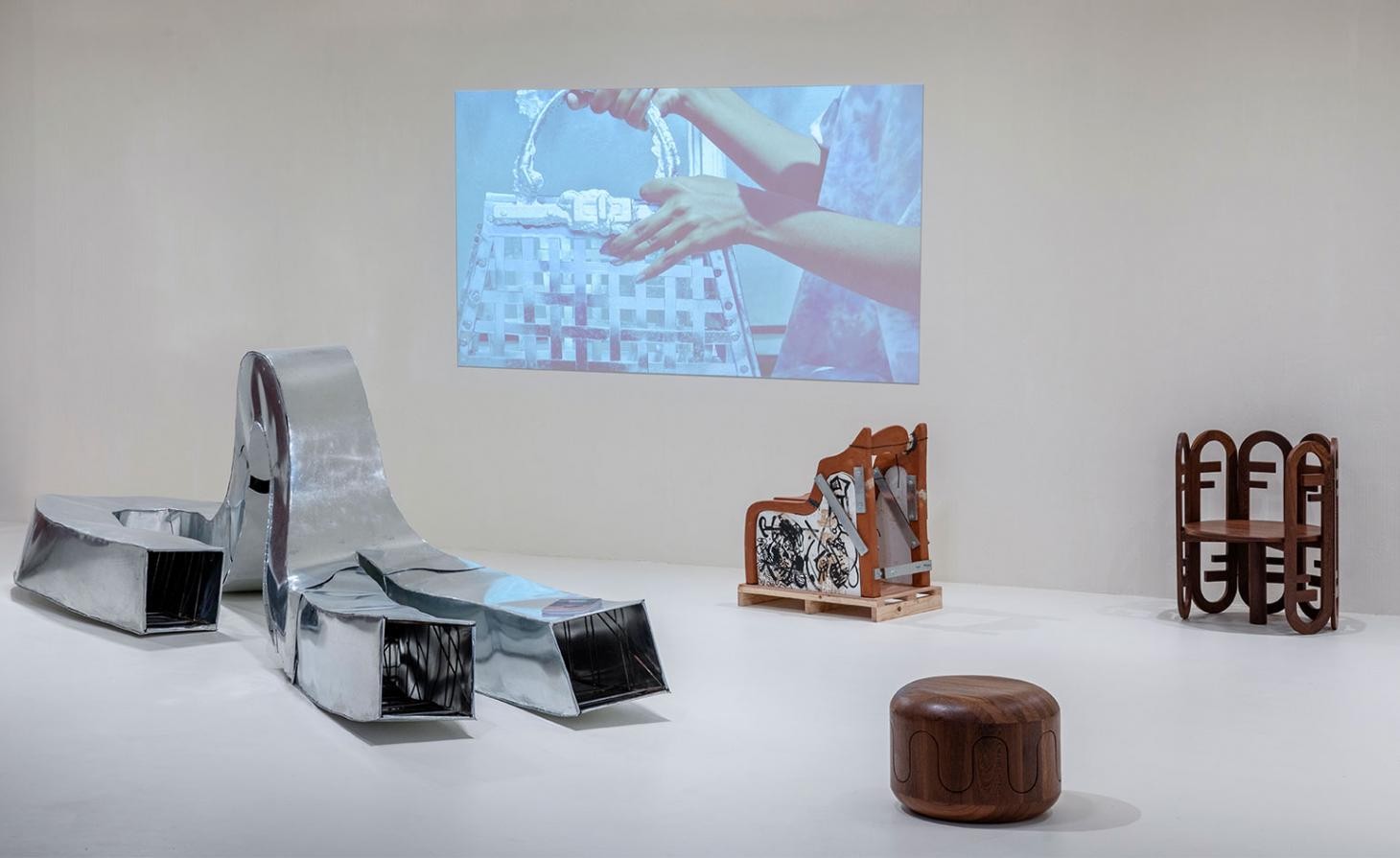
Όψη από εγκατάσταση στο Design Miami. Από αριστερά: Gabi-Gabi γλυπτό, πρωτότυπο της καρέκλας Foro σε πηλό, Loma stool και Maduo chair. Φωτογραφία: Robin Hill
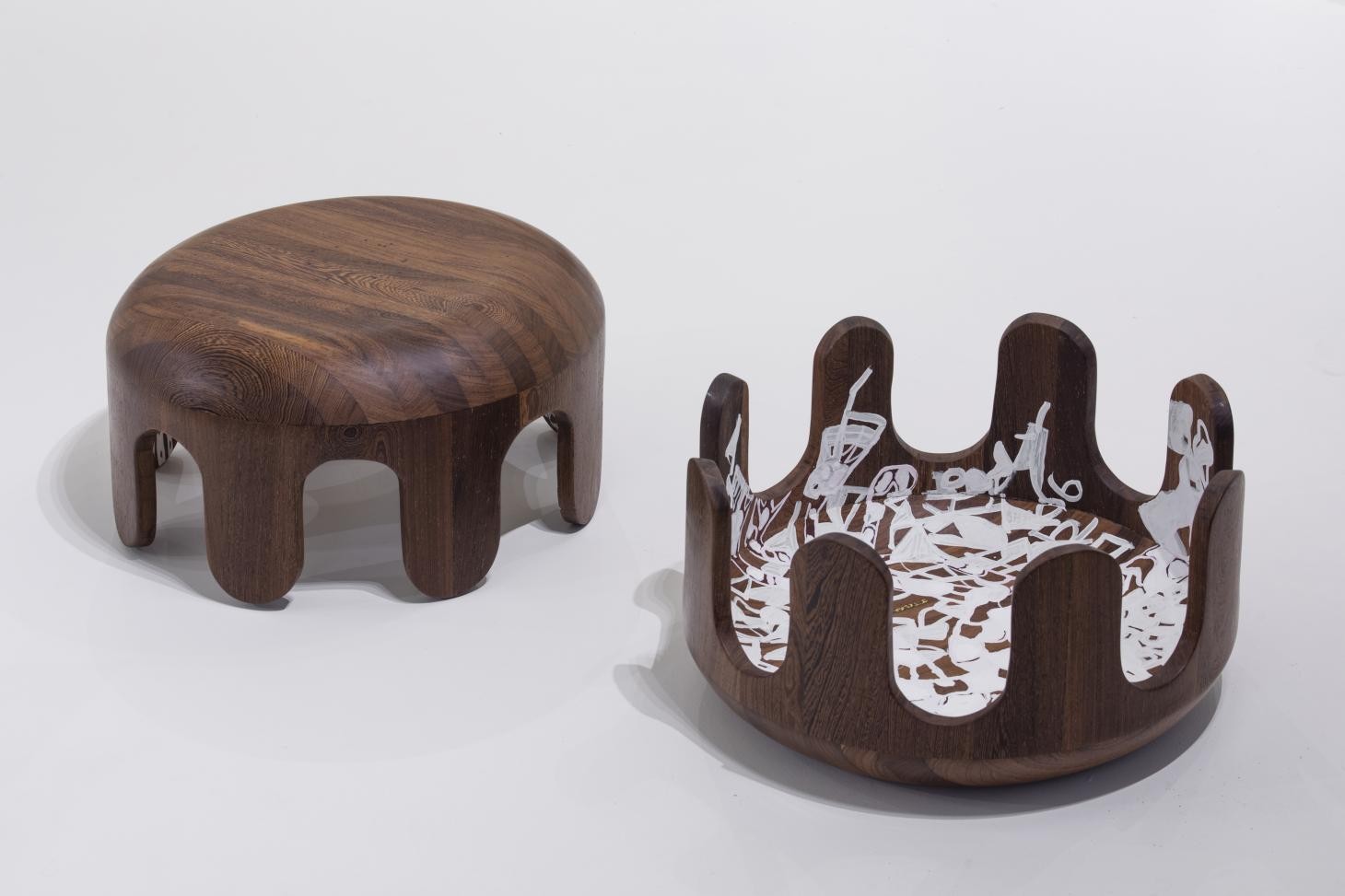
Loma stool από το MABEO studio
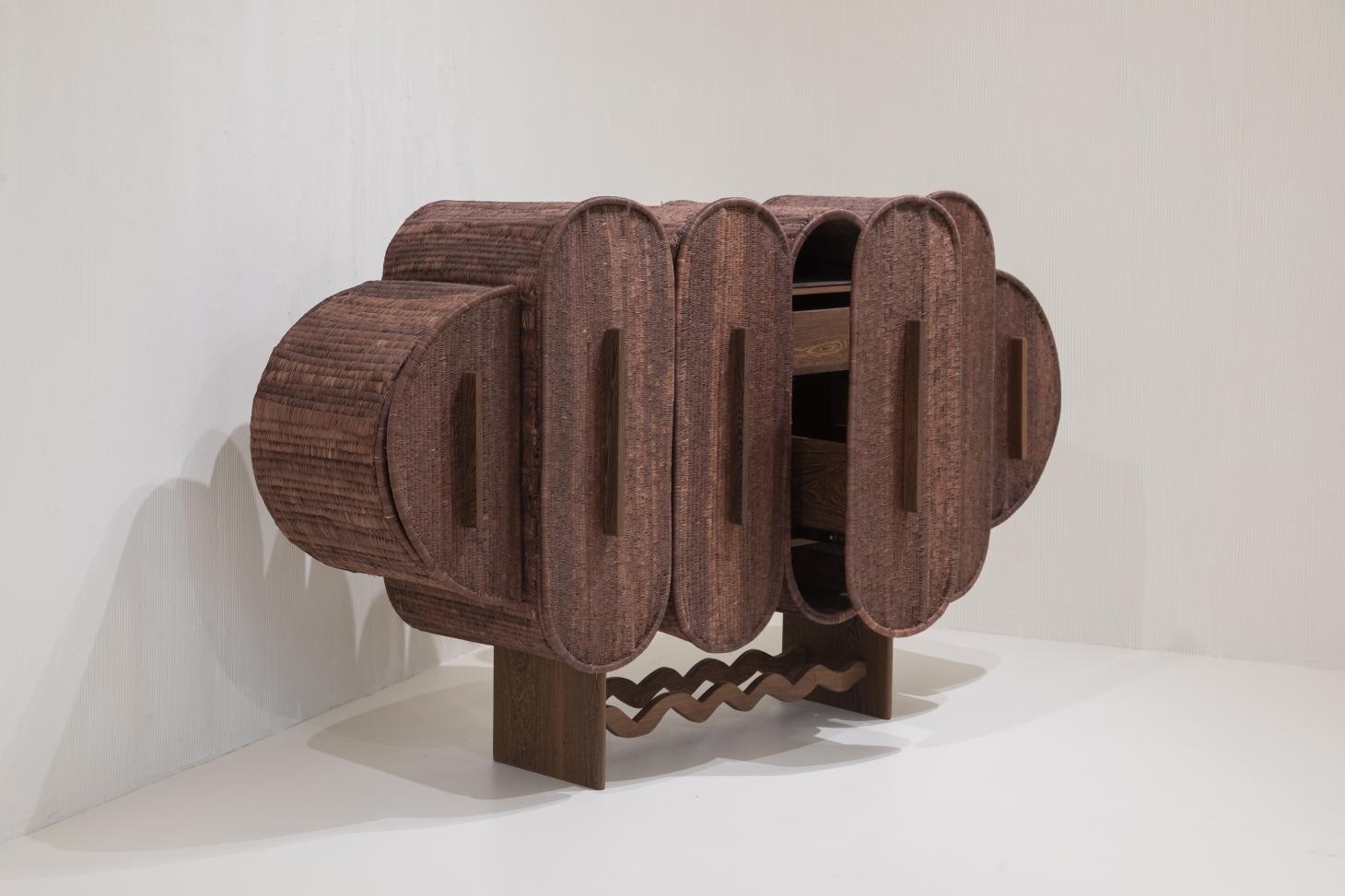
Chichira Cabinet από το Mabeo Studio
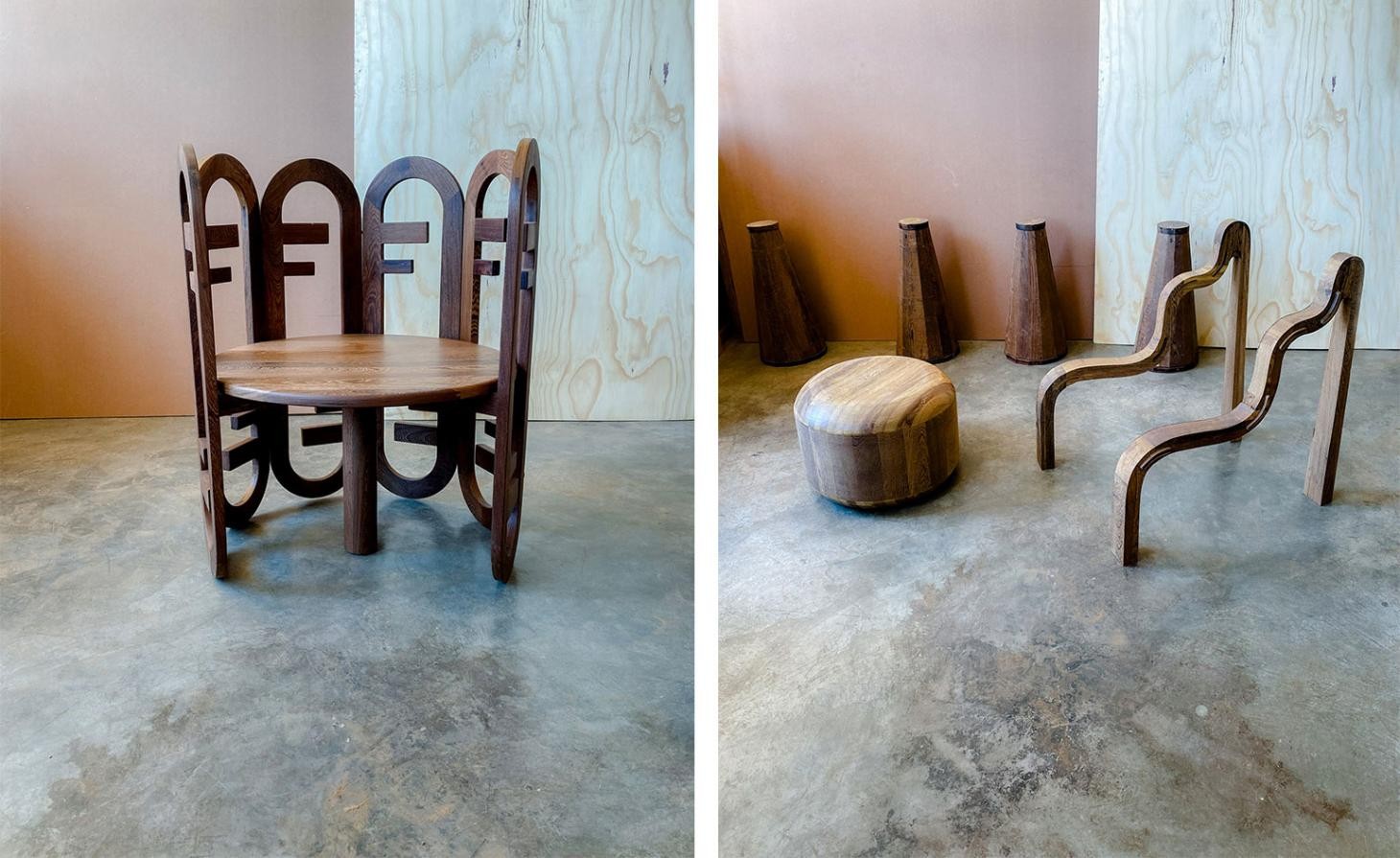
Αριστερά, εμπνευσμένη από σχέδιο κοσμήματος της Delfina Delettrez Fendi, η καρέκλα ‘Maduo’ που φτιάχτηκε από τεχνίτες από το Mmankgodi. Δεξιά, μια ξύλινη εκδοχή του καθίσματος ‘Loma’ και τα μπράτσα της καρέκλας ‘Foro’ να παίρνει σχήμα. Φωτογραφίες: David Nana Opoku Ansah
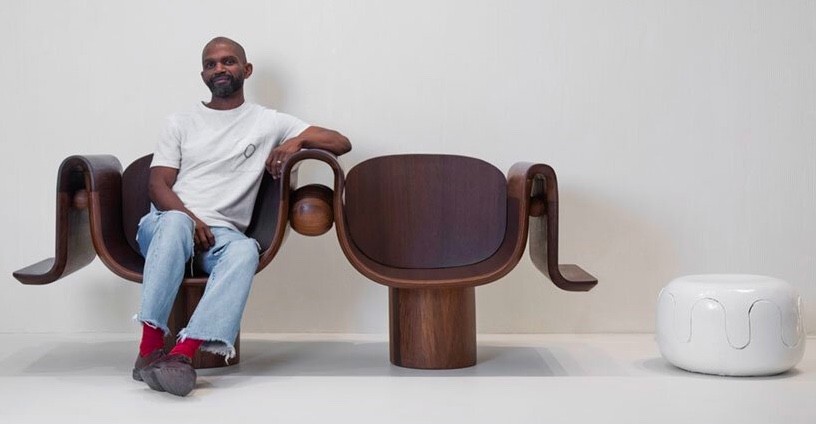
Φωτογραφία εξωφύλλου: Ocean Drive Magazine FENDI και Mabeo λανσάρουν νέα κολεξιόν στο Design Miami Φωτογραφία: Robin Hill
ΕΙΚΟΝΕΣ:
https://www.designboom.com/design/fendi-mabeo-kompa-collection-miami-2021-furniture-12-01-2021/
https://www.wallpaper.com/design/fendi-peter-mabeo-collaboration-design-miami-2021
Πηγές:
https://www.wallpaper.com/design/fendi-peter-mabeo-collaboration-design-miami-2021
https://www.mabeofurniture.com/
https://trueafrica.co/article/a-design-life-with-peter-mabeo/
https://www.weareafricatravel.com/contemporary-africa/making-africa-peter-mabeo/




